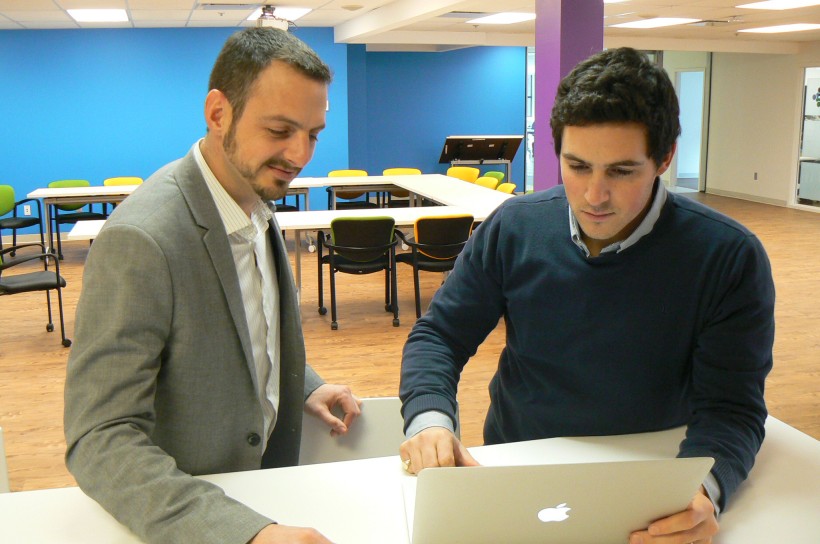There’s a theme of community running through the story of Ongozah.
The Moncton startup founded by Topher Kingsley-Williams, Denis Daigle and Dan Gillis is developing a platform that will help community groups crowdsource the various things they need. And to nurture the company, they relied on a new community startup facility in their hometown.
Ongozah – a Swahili word that means everyone moving in the same direction –is one of the startups being groomed in the Vennture Garage, the new program recently opened in the Venn Centre in downtown Moncton to help encourage young entrepreneurs. By working with the staff at the Garage, the Ongozah team has almost completed its product, found 15 customers and bagged a couple of investors.
Vennture Garage’s work with Ongozah is simply one example of a fairly new program that introduces young people to the tasks and philosophies of entrepreneurship. Such programs are springing up all around the region and becoming the farm teams for Propel ITC, the regional accelerator. There are a range of university programs, and there are community-focused pre-accelerator programs developing in Moncton, Sydney, and Prince Edward Island, to name a few.
“The idea for the Vennture Garage came out of the evolving circumstances in the ecosystem in New Brunswick and some excellent new programs,” said Doug Robertson, CEO of Venn Innovation, which operates the program. “But there were concerns about the quantity and quality of applicants to those programs.”
The idea is that society is awash in potential entrepreneurs, but most have been reared on traditional concepts of business that are outdated or just plain inaccurate. So these introductory programs familiarize them with concepts like ideation based on solving pain, customer discovery and the mysteries of the lean canvas. The programs also teach the virtues of failure, especially fast failure – a concept that is counterintuitive to most of us. In short, they are preparing entrepreneurs to apply for a facility like Propel.
On P.E.I., the provincial government has initiated its Ignition Program, which provides mentorship and $25,000 in early-stage capital to entrepreneurs interested in both startups and more traditional businesses.
Innovation PEI launched the program last June, and has so far invested a total of $200,000 in eight companies.
Mark Richardson of Cornwall, for example, got help from Ignition for his company, Skip the Waiting Room. It’s an online product that lets walk-in clinics help patients avoid long waits in a waiting room. The company went through the most recent cohort of the Propel accelerator.
Other startups that have tapped Ignition are Queen Bee Games of Pownal, and BamText Corp. of Charlottetown.
In Sydney, startups are gaining a boost from two recent introductions to the ecosystem – the UIT program at Cape Breton University and the Spark Cape Breton competition. Initiated last year, Spark differs from other startup contests in the region because it aims to give a bit of money ($5,000 to $50,000) to a broad range of winners. In two years, 14 companies have received funding from the award.
UIT, meanwhile, is an experimental tech/entrepreneurship course that will continue, even expand, next year. It has taught 12 students (six of them women) the basics of entrepreneurship, relying heavily on online curriculum.
“The energy that is in the startup community in Cape Breton right now is unbelievable,” said Bob Pelley, the Innovacorp executive in Sydney. “It’s a perfect storm of UIT and the success of Spark and other factors. It’s all just highlighting what can be done here.”
Back at the Vennture Garage in Moncton, Robertson and Entrepreneur-in-Residence Dave Gallant have established a program in which participants can enter and leave at any time and still benefit. It provides co-working space free for the participants, and works hard to encourage young people to learn about entrepreneurship. They focus a lot on what makes a good idea for a business.
“A lot of us never know how to come up with a good idea,” said Gallant. “I have people come in that have a desire to be an entrepreneur . . . but they don’t have a good idea [for a business].” So his instruction focuses on how to test ideas with potential clients and how to plot the stages from idea to development. “I help them come up with an idea that solves a problem.”
Still in its first year, the numbers speak to its success. Twenty-one teams have applied and there are now 10 or 11 active teams working in the Garage. Three have entered Breakthru, and three or four have decided to leave the program.
“To enter the Garage, they have to look at the problems, look at the solutions and they have to go out and validate it,” added Robertson.
“They have to talk to 10 people a week for one month. They need to come back with the results.”
This article originally appeared in the latest Entrevestor Intelligence report.
Entrevestor receives financial support from government agencies that support start-up companies in Atlantic Canada. The sponsoring agencies play no role in determining which companies are featured in this column nor do they have the right to review columns before they are published.










